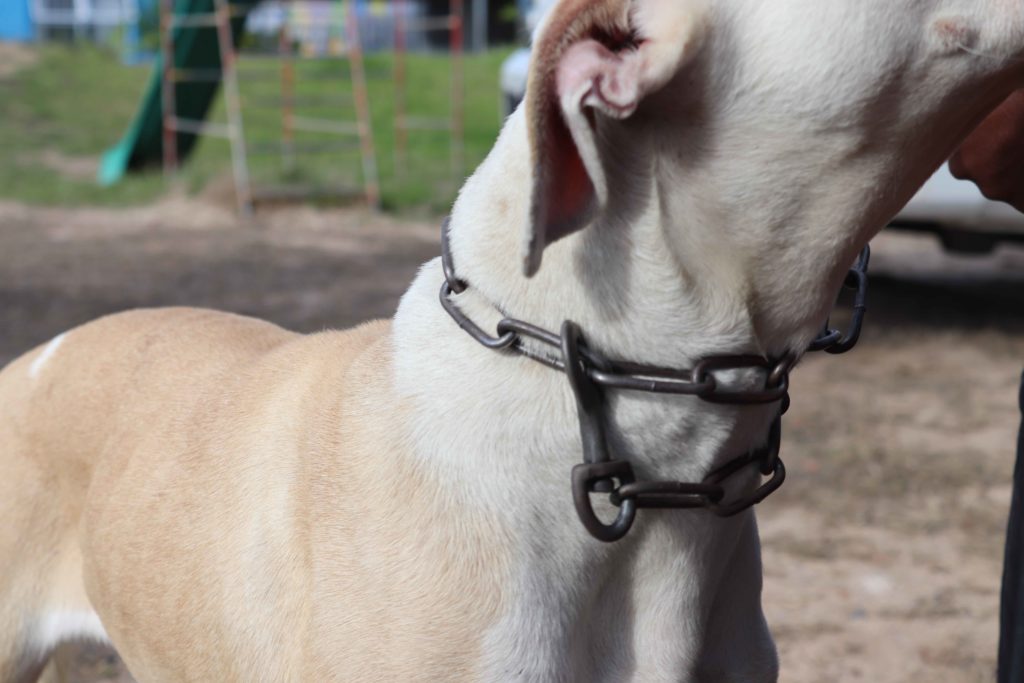The TEARS Animal Rescue Veterinary Clinic and Mobile Clinic work jointly to mobilise free veterinary and primary healthcare services to vulnerable companion animals.
More and more cases of animal neglect and abuse are being recorded by the TEARS Clinic, which performs about 200 sterilisations every month, as well as 200 Feral Cat sterilisations.
The charity, which has been operating as a leading Public Beneficiary Organisation (PBO) for the last 22 years, has recently highlighted the negative impact of Lockdown on low-income communities where thousands of pet owners haven’t been able to vaccinate, sterilise or adequately feed their animals; many of whom implement cruel and inhumane chaining methods as a means of keeping animals restrained.

Says TEARS Head of Fundraising and Marketing, Lara Van Rensburg “In the last week alone TEARS Vets have operated on two dogs with horrendously deep, festering wounds due to metal chains becoming embedded in their necks. We launched the TEARS “Break The Chains” fundraising campaign earlier this month to deliver against three of our biggest operational mandates, including veterinary and healthcare; education and outreach; and rescue, rehabilitation, and rehoming. We’re desperately seeking support from local hardware and pet accessory retailers to partner with us in providing humane chaining and collaring solutions, the value of which would be tax deductible based on our PBO status”.
The TEARS Veterinary Clinic has become a critical part of the COVID-19 Relief work that is needed in order to directly reduce the knock-on effect of pet overpopulation in low income communities, provide pet food and healthcare support to vulnerable animals, and reduce the incidence and spread of infectious and deadly animal-borne diseases like Parvo and Distemper.

TEARS Operations Manager, Mandy Store believes that intervention combined with education, and supported by essential veterinary healthcare, is the only way TEARS can decrease the negative impact of overpopulation, poverty, and ignorance, with the aim of facilitating a healthier pet and human population in those communities.
“Every animal welfare organisation in the Western Cape can attest to the overwhelming need that exists in at-risk communities where resources are extremely limited with many animals suffering from the results of not being vaccinated against preventable diseases and an escalation in cases of neglect where there is a cynical disregard for the wellbeing of the animal,” comments Mandy.
By adopting a partnership-approach, TEARS is able to increase its impact in low-income communities. 30% of TEARS sterilisations are in support of other animal welfare groups, which include AfriPaw in Vrygrond; 1 Kennel at a Time in Ocean View; DARG (Domestic Animal Rescue Group) in Hout Bay, Adopt-a-Pet in Philippi, Pitpals, Redhill Animal Rescue, Network for Animals, and the Cape Animal Welfare Forum.

TEARS hopes to attract Cause-Marketing and Corporate Social Investment (CSI) partnerships that will allow the organisation to effectively deliver much-needed resources and support where the need is greatest
Lara concludes, “Strategic brand-sponsorships have the potential to result in a win-win outcome for the sponsor and the beneficiaries alike. More and more consumers are looking to support companies that are doing good.
By being associated with an impactful and measurable animal outreach social justice programme, a company can increase its brand equity and goodwill amongst its target market.”
In 2020, the TEARS Veterinary Clinic treated 6 100 animals.
5 716 animals were sterilized
2 789 animals were vaccinated
710 pets were rescued
373 dogs
337 cats
879 pets were rehomed
Capetonians can help by donating to the TEARS Break the Chain Campaign by visiting the TEARS website and/ or donating new or used dog collars and leads. These can be dropped off at one of TEARS’ four Charity Shops or the TEARS Kennel or Cattery.
Visit www.tears.org.za/break-the-chains to learn more and support the project.
Picture/s: Supplied

